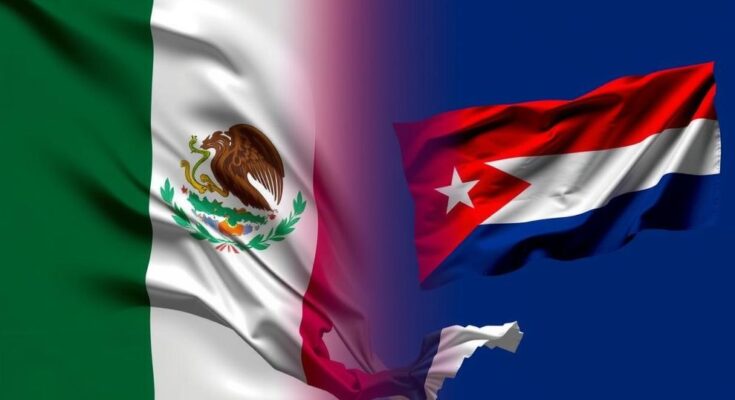Mexico has increasingly allied itself with the dictatorships of Cuba, Venezuela, and Russia by providing aid and support to Cuba, notably in the form of oil. This involvement raises significant concerns regarding its commitment to democratic values as it neglects human rights issues within Cuba and faces its own internal crises. The support for Cuba is seen as an endorsement of a regime notorious for its human rights abuses and lack of democratic processes.
Mexico has recently aligned itself with countries such as Russia and Venezuela by providing substantial support to Cuba’s long-standing dictatorship. Historically, Cuba received immense assistance from the Soviet Union, which contributed over $29 billion in various forms, followed by Venezuela’s significant aid of approximately $35 billion in oil contributions during Hugo Chavez’s regime. In the current context, as Venezuela faces its own crises, Mexico has emerged as a crucial supporter of the Cuban regime, supplying food, oil, and other resources in a bid to bolster a failing communist economy. As part of this troubling diplomatic stance, Mexico’s government has engaged in coercive negotiations with the United States regarding immigration policy, leveraging its position to prompt discussions that favor Cuba. Mexico’s president, Andrés Manuel López Obrador, has even gone so far as to reject the Summit of the Americas based on issues related to the invitation of Cuban, Nicaraguan, and Venezuelan leaders. Despite facing its own internal violence and chaos, including violent incidents in states like Sinaloa, President Claudia Sheinbaum has prioritized supporting Cuba, which culminated in a landmark commitment to supply 5.4 million barrels of oil—valued at approximately $391 million—to the Cuban regime. This act represents a clear endorsement of a government that has a notorious record of human rights abuses, including housing 1,100 political prisoners and enduring 65 years without democratic elections. The support extends beyond mere economic aid; Sheinbaum’s statements indicate a willingness to fulfill Cuba’s requests without the prerequisite of reforms that would benefit the Cuban populace. Such generosity stands in stark contrast to the dire situation faced by many in Mexico, where recent blackouts and energy crises reflect deep-rooted inefficiencies and mismanagement akin to that observed in Venezuela prior to its downfall. Moreover, the Cuban government has exhibited a pattern of systemic corruption and mismanagement, evidenced by its reliance on Mexican resources while simultaneously neglecting the needs of its citizens. Mexico’s commitment to assisting Cuba not only serves to reinforce an oppressive regime but also undermines Mexico’s democratic integrity through simultaneous actions that erode its own democratic frameworks. In this context, it is crucial to recognize that support for Cuba should be contingent upon the release of political prisoners and the establishment of democratic processes. Instead, what is observed is an unequivocal endorsement of a dictatorship that thrives on suppression and brutality, highlighting Mexico’s moral and ethical decline in the realm of international diplomacy.
The historical relationship between Cuba and its external supporters dates back to the Cold War, when the Soviet Union emerged as Cuba’s primary benefactor, providing significant financial and military assistance. Following the dissolution of the Soviet Union, Venezuela took on a similar role under Hugo Chavez, yet has since faced severe economic challenges. In the latter stages, Mexico, a key trading partner with the United States, has increasingly stepped in to fill the void left by Venezuela’s diminished capacity to assist Cuba, thus inadvertently prolonging the suffering of the Cuban populace under an authoritarian regime.
In summary, Mexico’s unwavering support for Cuba’s dictatorship mirrors a blatant disregard for democratic values, prioritizing the sustaining of an oppressive regime over the welfare of its citizens. Key figures in the Mexican government have pledged substantial resources to Cuba while ignoring critical human rights issues within the island. This trajectory not only compromises Mexico’s integrity on a global scale but also raises concerns regarding its domestic policies and the potential erosion of its own democratic principles. A meaningful shift towards supporting the Cuban people necessitates clear conditions tied to human rights improvements and democratic reforms, which currently remain absent.
Original Source: thehill.com




